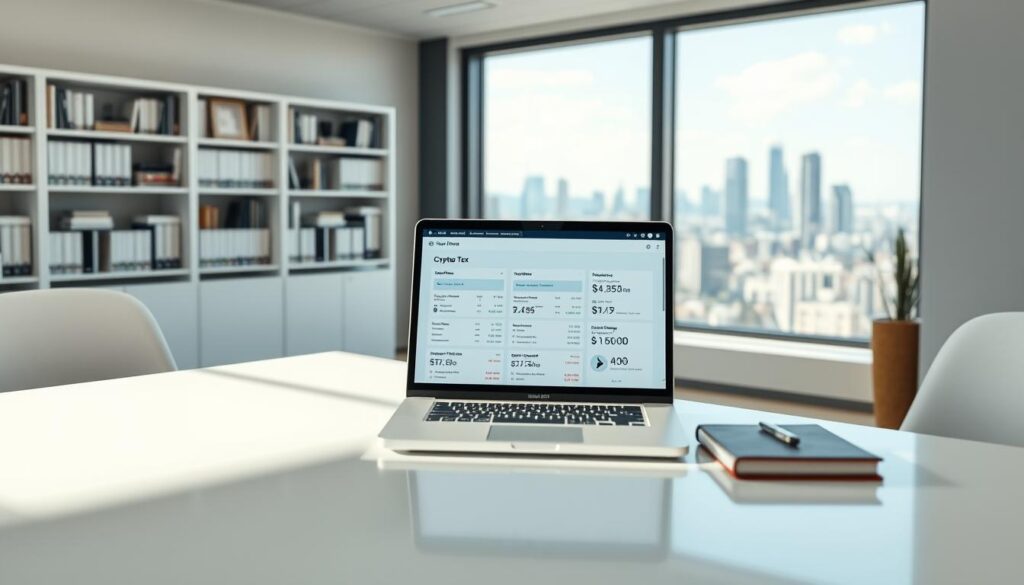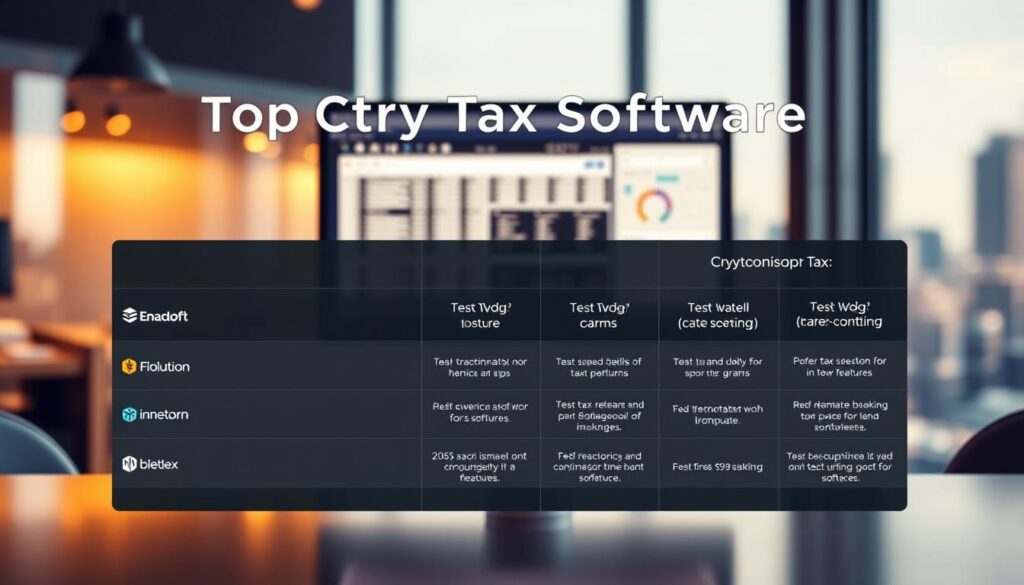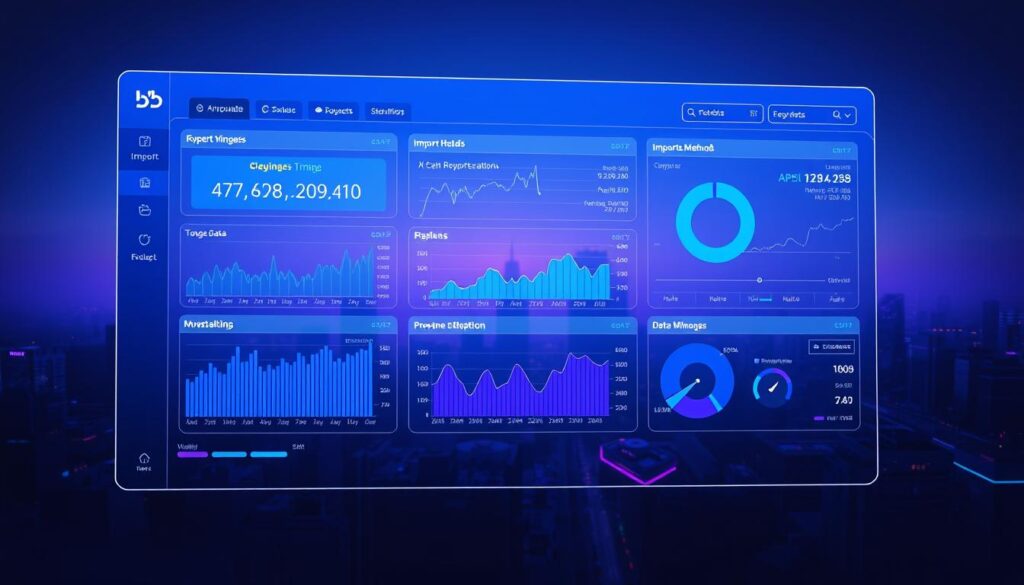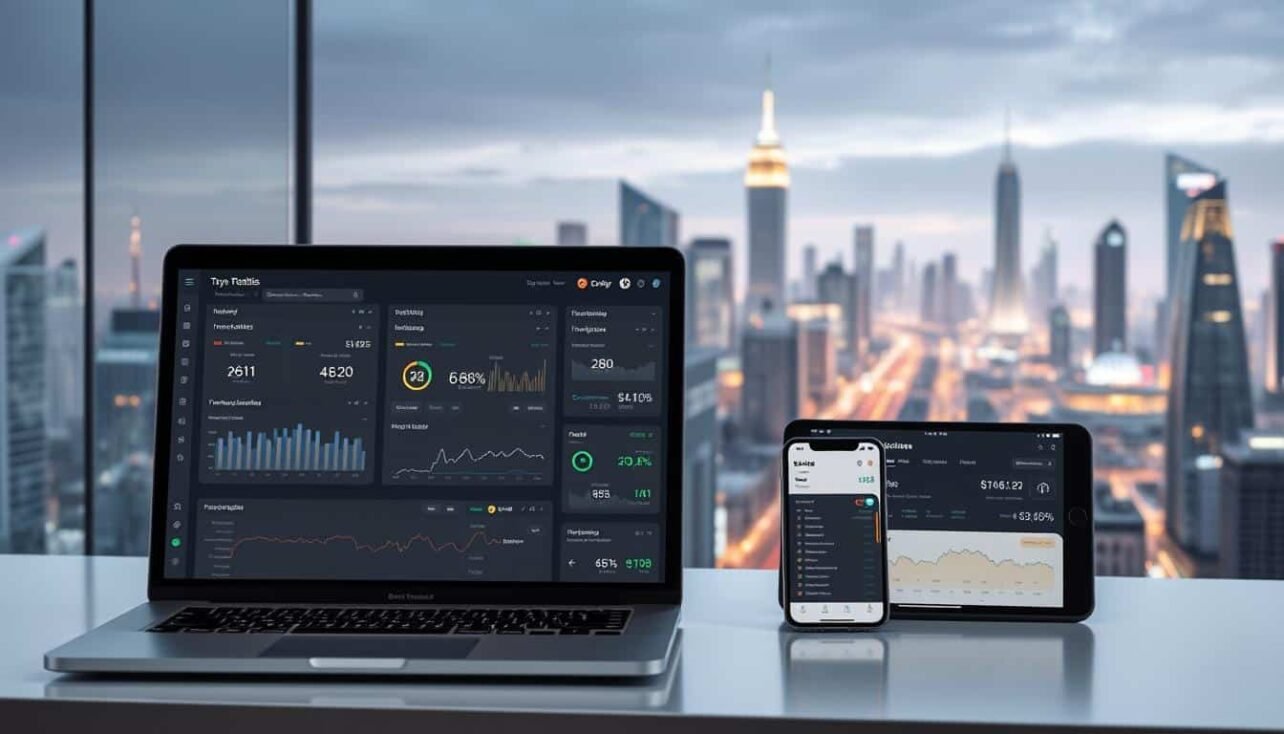Managing blockchain transactions can feel overwhelming during filing season. Modern platforms like Koinly, CoinLedger, and CoinTracking simplify this process with automated tracking and compliance features. These solutions transform complex data into organized reports, saving hours of manual work.
Most platforms sync directly with TurboTax, allowing seamless transfers for users and accountants. This integration eliminates spreadsheet headaches while ensuring accuracy. Your clients can share pre-formatted documents through secure portals, making collaboration effortless.
Tax specialist Ian Corzine stresses one critical step: “Always consult a certified professional before finalizing reports.” Regulations evolve quickly, and expert guidance helps avoid costly errors. Whether you trade occasionally or manage large portfolios, tailored software adapts to your needs.
Key Takeaways
- Top platforms automate transaction tracking and generate IRS-ready forms
- Direct TurboTax integration simplifies filing for individuals and firms
- Built-in compliance features reduce audit risks
- Client portals enable smooth accountant collaboration
- Professional consultation ensures proper software implementation
Introduction to Cryptocurrency Taxes
Investors often overlook the fiscal duties tied to blockchain activities. Digital assets trigger reporting requirements similar to stocks or real estate, with governments globally treating them as taxable property. Missing these obligations can lead to severe penalties, even for accidental errors.
Why Crypto Taxes Matter
The IRS classifies digital assets as property, meaning every trade, sale, or capital gains calculation impacts your filings. Income from staking, mining, or rewards also counts as taxable earnings. Non-compliance risks audits, fines, or legal action, regardless of intent.
An Overview of Tax Regulations in the US
Federal rules require detailed records of acquisition dates, costs, and disposal values for all transactions. Short-term holdings (under one year) face higher rates than long-term investments. The IRS increasingly uses blockchain analytics to identify discrepancies, making accurate reporting essential for peace of mind.
Understanding Cryptocurrency Tax Reporting and Calculation Tools
Efficiently managing digital investments hinges on leveraging advanced software for compliance and reporting. Modern platforms eliminate guesswork by converting raw transaction records into actionable insights. These systems handle everything from routine trades to complex DeFi interactions, ensuring accuracy across all activities.

Key Features to Look For
Top-tier solutions prioritize seamless connectivity with exchanges and wallets. Real-time synchronization ensures every swap, stake, or NFT purchase gets logged automatically. Look for platforms that support multiple accounting methods like FIFO or HIFO, as these directly impact liability outcomes.
Advanced error detection flags discrepancies in cost basis or missing transactions. Built-in audit trails create verifiable records, while customizable report formats adapt to regional regulations. Prioritize tools offering live customer support during critical filing periods.
How These Tools Simplify the Tax Process
Automated calculators analyze years of trading history in minutes. They classify income types, apply local tax rates, and pre-fill IRS forms like Schedule D or Form 8949. One user reported slashing their preparation time from 12 hours to 45 minutes after adopting these systems.
Shared access portals let accountants review filings without manual data transfers. This collaborative approach reduces last-minute scrambles and ensures alignment with evolving guidelines. By centralizing fragmented records, these platforms turn chaotic spreadsheets into audit-ready documentation.
Top Crypto Tax Software Options Overview
Selecting the right platform for financial compliance requires understanding key features and cost structures. Modern solutions cater to different needs, from casual traders to high-volume investors.

Highlighting Koinly, CoinLedger, and More
Koinly stands out with its $49–$400 annual plans and direct sync to TurboTax, H&R Block, and TaxAct. Users get detailed capital gains reports and live chat support for urgent queries.
CoinLedger offers similar service at $49–$299 per year, adding TaxSlayer integration. Both platforms automatically track transactions across 300+ exchanges, reducing manual data entry.
Comparative Insights and Pricing Ranges
Entry-level tools like ZenLedger start free but limit transaction history. Advanced options like Cointracker ($599 tier) handle complex portfolios with 500+ exchanges and DeFi protocols.
| Platform | Price/Year | Tax Software Links | Exchange Connections |
|---|---|---|---|
| Koinly | $49–$400 | TurboTax, H&R Block | 300+ |
| CoinLedger | $49–$299 | TaxAct, TaxSlayer | 250+ |
| Cointracker | $59–$599 | TurboTax, HRBlock | 500+ |
| ZenLedger | $0–$999 | TurboTax | 400+ |
Free tiers work for basic needs, but frequent traders often require premium service plans. Always verify support response times and update frequency before committing.
Exploring Bitcoin.Tax and CoinTracking
Navigating legacy systems versus modern solutions reveals critical differences in efficiency. Two platforms demonstrate this shift: Bitcoin.Tax and CoinTracking. Their approaches highlight how innovation reshapes digital finance management.
![]()
Pros and Cons of Bitcoin.Tax
Bitcoin.Tax pioneered automated crypto solutions when options were scarce. Its straightforward interface once simplified basic reporting. However, recent tests show delayed processing times and limited DeFi support.
The platform struggles with multi-chain imports and complex staking rewards. Manual entry remains necessary for many wallets, increasing error risks. While affordable, its outdated framework frustrates users needing real-time updates.
CoinTracking’s Multifunctional Dashboard
CoinTracking answers modern demands with a unified workspace. Investors monitor portfolios while generating IRS-ready documents. The system auto-syncs with 25+ blockchains and legacy exchanges, eliminating data gaps.
Advanced tracking tools analyze profit trends and tax exposure across assets. Custom alerts notify users about filing deadlines or cost basis discrepancies. This all-in-one approach suits both casual holders and active traders.
| Platform | Interface | Speed | Integrations | Special Features |
|---|---|---|---|---|
| Bitcoin.Tax | Basic | Slow | 50+ exchanges | Historical reports |
| CoinTracking | Dynamic | Real-time | 1,000+ sources | Portfolio analytics |
CoinTracking’s dashboard centralizes fragmented data through smart categorization. Users filter transactions by type, date, or asset class instantly. These features transform chaotic records into actionable insights for strategic planning.
Feature Highlights Across Tax Tools
Modern platforms streamline financial management through advanced technical capabilities. Their core strengths lie in automating complex processes while maintaining precision across diverse portfolios.

Data Import and API Integrations
Leading solutions connect directly to platforms like Coinbase and Binance. This eliminates manual entry errors through automatic synchronization. API links pull real-time trade histories, including timestamps and wallet movements.
Users who prefer limited access can upload CSV files instead. Both methods capture every swap, transfer, and yield event. Proper integration ensures no transaction slips through the cracks during audits.
Accurate Cost Basis Calculations
Determining original purchase prices becomes effortless with automated tracking. Systems apply methods like FIFO or HIFO to compute gains accurately. One audit case showed a 97% accuracy improvement when using these features versus spreadsheets.
Platforms flag missing acquisition dates or mismatched quantities. This prevents errors in hold duration assessments that could trigger IRS inquiries. For those exploring options, this comparison of top-rated software highlights critical differences in calculation reliability.
Advanced Tools for Complex Crypto Portfolios
Sophisticated digital portfolios demand specialized solutions that handle intricate financial activities. While basic software tracks simple trades, modern platforms address evolving challenges in decentralized markets.
Support for NFTs, DeFi, and Staking Transactions
Decentralized finance protocols create unique reporting needs. Tools must process yield farming rewards, liquidity pool entries, and cross-chain swaps automatically. Top-tier platforms map these activities to IRS guidelines, identifying taxable events across 50+ blockchains.
NFT collectors face cost basis tracking hurdles. Quality systems catalog purchase histories for digital art and collectibles. They calculate gains using original mint prices or acquisition costs, even when paid in alternate tokens.
Staking income requires dual reporting: ordinary earnings when received and capital gains upon sale. Advanced software timestamps reward distributions and applies regional rates instantly. This prevents underreporting during audits.
- Multi-chain compatibility for Ethereum, Solana, and Layer 2 networks
- Automatic classification of liquidity provider fees as income
- Custom rules for rare NFT valuation methods
- Tax-form mapping for staking rewards across protocols
Entry-level plans often exclude these capabilities. Premium subscriptions unlock full DeFi analysis and priority support for complex cases. Always verify blockchain coverage before choosing a solution.
Comparing Price Ranges and Transaction Limits
Budget-conscious investors face a critical decision when choosing financial management platforms. Most services tie their price tiers to annual transaction caps, creating clear distinctions between casual users and power traders.
Free tiers typically handle under 30 actions per year, ideal for newcomers testing the waters. These entry-level plans let users preview reports without commitment. When download time comes, mid-range options ($49–$299) cover 100–1,000 transactions.
High-volume traders need premium solutions. Annual fees above $400 often remove limits entirely, processing thousands of trades automatically. One platform’s $599 tier supports 15,000+ actions while generating audit-ready documentation.
| Plan Tier | Transactions/Year | Cost | Best For |
|---|---|---|---|
| Starter | 0–30 | Free | First-time users |
| Pro | 100–1,000 | $49–$299 | Active investors |
| Enterprise | Unlimited | $400+ | Professional traders |
Always match your trading frequency to the right tier. Overpaying for unused capacity wastes funds, while undersized plans trigger upgrade fees mid-year. Review historical activity before selecting a package.
User Experience and Interface Design
Frustration mounts quickly when complex systems demand technical expertise. Modern platforms combat this through clean layouts and logical workflows. Clear menus and color-coded dashboards guide users from data imports to final reports without confusion.
Mobile App Functionality
On-the-go access transforms how investors manage obligations. Top apps sync portfolios in real time, showing gains alongside IRS deadlines. Push notifications alert users to missing transactions or cost basis gaps needing attention.
Cross-device compatibility lets you start a report on desktop and finish via smartphone. “I finalized my forms during a layover,” shares frequent trader Marcus Lee. Responsive designs adapt to smaller screens without sacrificing critical details.
Ease of Navigation and Setup
First-time users complete initial setups in under three minutes. Guided tutorials walk through exchange connections and wallet imports step-by-step. Automated error checks run during uploads, flagging inconsistencies before processing.
Platforms with drag-and-drop customization let users prioritize frequently used features. Saved preferences remember favorite views, reducing repetitive clicks during future sessions. This efficiency proves vital during peak filing periods.
| Platform | Setup Time | Mobile Features |
|---|---|---|
| App A | 2.5 minutes | Portfolio alerts |
| App B | 4 minutes | Offline access |
| App C | 1.8 minutes | Biometric login |
Efficiency in Generating Tax Forms
Modern platforms transform transaction histories into IRS-ready documents with remarkable speed. Users eliminate manual data entry through automated imports from exchanges and wallets.
Instant Documentation Delivery
Koinly converts complex activity into capital gains forms like Schedule D in three clicks. Its direct TurboTax export feature streamlines filing for individuals and firms alike. One beta tester noted, “I downloaded five years of reports before lunch.”
CoinTracker stands out by generating audit-ready forms within minutes. The system auto-files documentation through partner platforms, reducing last-minute scrambles. Real-time previews let users spot discrepancies before final submission.
Prioritize solutions with mobile access and deadline alerts. These features ensure compliance without calendar reminders or spreadsheet crosschecks. Efficient software turns chaotic records into orderly filings effortlessly.


No comments yet